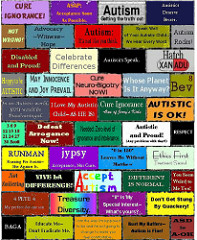Because I’m up to my tuchis here getting ready to prepare the chicken tamales, baklava, mince tarts, potato latkes and whatnot, here’s a re-run of a holiday-oriented classic post (from 2006):
TODAY’S QUOTE:
“Nobody realizes that some people expend tremendous energy merely to be normal.”
~Albert Camus
There’s a newsclip kicking around the Web, from the CBS Evening News of February 23rd, 2006. Normally I don’t pay attention to basketball. Or baseball. Or football. Or hockeyball (joke). This newsbite is different. So different that CBS felt compelled to make a last-minute change in their programming plans to show this “incredibly powerful” story.
The newscaster explains, “Because he has been so devoted to the team, for the last game of the season, Coach Johnson actually decided to let Jason suit up – not to let him play necessarily, just to let him feel what it’s like to wear a jersey.”
And then near the end of the game the coach even lets him onto the court. Finally getting to play in a game, rather than fetching water and toweling down sweaty team-mates, the basketball player made six three-point throws. The crowd goes wild.
Gee, you’d think that a coach would want a player who could shoot like that to be on the court all the time …
The whole situation reminds me of how I felt every year when the “Rudolph the Red-Nosed Reindeer” animated Christmas show appeared on television. (links to show posted on YouTube; Rudolph introduced at 4:06.) There was always something unsettling about the whole story of this reindeer with the glowing nose, and it wasn’t until late in my own high school years that I figured it out.
No one liked Rudolph because he was different. In the beginning, his family tries to hide his nonconformity, covering up his nose with mud, but then Rudolph talks funny from the congestion. Still, it is deemed better that Rudolph be perceived as talking funny, than for everyone to actually know the truth. Eventually the disguise breaks down, and Rudolph’s glaring, glowing nose is revealed in the rough-and-tumble of playground mischief. Everyone is horrified. They always are when someone tries to “pass for normal” and is eventually outed. People feel deceived, because the Other was not what they thought.
The reindeer games coach orders Rudolph away. So shunned, he leaves his North Pole village, joining up with another misfit, Herbie the elf, who wanted to be, oh horror, a dentist rather than a toy-maker.
A few years later there is a Christmas eve of such epically foggy proportions that Santa Claus cannot make his usual gift-giving rounds. Santa realizes that he can still do so if Rudolph is allowed to lead. Eventually everyone decides to tolerate the mutant reindeer, perhaps accept Rudolph a little bit, but only because he can be useful to them, lighting the way for Santa’s sleigh. (Herbie gets to be a dentist, another occupation that is tolerable because it is useful to the others, rather than because Herbie has a passion for dental care.)
The program was made in the early 1960’s, coming off of the ultra-conformism of the 1950’s. Everyone thought it was cute and sweet. I couldn’t explain the intrinsic discomfort I felt as a child, not from viewing that particular show, or even in everyday life. Nor could I explain why I identified so strongly with Rudolph or for that matter, the alien Spock from “Star Trek”. When the neighbor girls compared me to the Professor from “Gilligan’s Island”, I couldn’t understand why that wouldn’t be a compliment – he was the only sensible one of the castaways! But even the Professor, a quintessent geek (though thankfully neither of the foolish nor ugly duckling sort), was the odd one out.
The telethon poster child or “odd team-mate” is held up in the same way, but also held away at arm’s length, and Othered. We’ll let him be on the team in an accessory manner because it makes us feel munificent, and because he might be exceptionally good at something we need. (Were he merely mediocre, or even near or at the bottom of the list for overall skills, would he be on the team?)
But the mere fact that a team-mate is known more for being different than for any aptitude or acquired skill, and even the fact that stories about such people are circulated as ABSOLUTELY AMAZING! and exceptional shows that pity is still stronger than acceptance.
The problem with pity is that it creates division; it puts distance between people.
Pity prevents respect by implying inferiority; there is a humiliating lack of worth, because the person is defined by what they cannot do instead of what they can do. Victims receive pity – but nobody wants to be a victim!
Pity is disempowering. It does not decrease burdens by sharing resources and abilities. The people who see only the “broken” part are uncomfortable; that discomfort is a kind of Schadenfreude, a sense of relief that the bad thing (the disability) did not happen to you.
Pity is like magical thinking, where people want to give Fate some kind of token payment to avoid similar disaster from befalling them.
Pity is similar to both fear of the other, and to contempt for the Other; the Other must somehow have done something bad, and “deserved” their fate (as given to our social mores from the Puritan ethos). Either way, it is dismissive of the person’s concerns, and denies their opinions, and their own personal view of reality.
Pity is not the same thing as compassion, where the other person is seen as being similar to one’s self, and is identified by who they are, is known for what they can do, and is accepted as being a worthwhile person to play with or work with, and to know and to love.
“Because he has been so devoted to the team, for the last game of the season, Coach Johnson actually decided to let Jason suit up – not to let him play necessarily, just to let him feel what it’s like to wear a jersey,” says the newscaster.
::BARF::
Meanwhile, too many people work endlessly hard at trying to “pass for normal”. The problem with pretending to be normal is that it gives power to the paradigm, to this concept of normalcy. As long as the person is pretending to be whatever kind of average-normal they are not, they are devaluing themselves and allowing others to devalue them, and they are handing over their personal power to the realm of the imaginary Normal people.
Normal, average people are imaginary, because no-one is wholly average and normal. However, the imaginary-normal people are a very real majority group. They all pretend to be normal, and en masse they have majority power under that paradigm.
Wow, isn’t it absolutely amazing! Autistics can play basketball. Next thing you know, they’ll let Negroes or women play basketball …
Feh.







